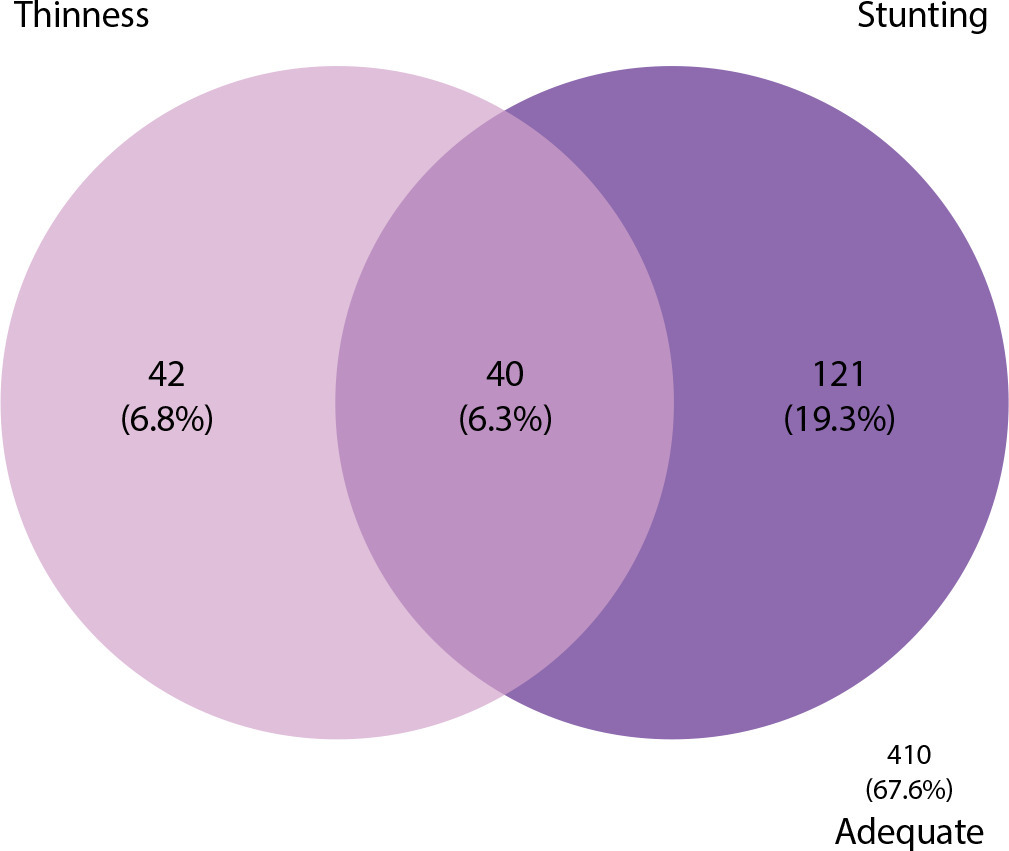-
ORIGINAL ARTICLE
Undernutrition and associated factors in primary schoolchildren in Lokossa, Benin: a cross-sectional study
Revista Brasileira de Enfermagem. 2022;75(3):e20210254
11-29-2022
Resumo
ORIGINAL ARTICLEUndernutrition and associated factors in primary schoolchildren in Lokossa, Benin: a cross-sectional study
Revista Brasileira de Enfermagem. 2022;75(3):e20210254
11-29-2022DOI 10.1590/0034-7167-2021-0254
Visualizações0Ver maisABSTRACT
Objectives:
to estimate the prevalence of stunting and thinness and sociodemographic, household, family, dietary, and scholar associated factors in schoolchildren living in Lokossa-Benin.
Methods:
a survey conducted in a probabilistic sample (n=615) of primary schoolchildren (8-17 years), from 12/2018 to 01/2019, using structured questionnaire and 24-hour dietary recall. Thinness and stunting were defined as Height-for-age and Body Mass Index-for-age below-2 standard deviations, respectively. Associations were estimated by chi-square test and logistic regression.
Results:
thinness and stunting prevalence was 13.1% (95%CI:9.0-18.7) and 25.5% (95%CI:20.6-31.2), respectively. Odds of thinness were higher among older schoolchildren and those who experienced hunger at school. Odds of stunting increased with age, low diet diversity, experiencing hunger at school, and having school meal five days a week (OR:2.09; 95%CI:1.29-3.36).
Conclusions:
stunting was the most common problem. Older schoolchildren and those with food deprivation or poor diet diversity were the most affected.

-
ORIGINAL ARTICLE
Gait speed and malnutrition in hospitalized patients and the quality of life of their caregivers
Revista Brasileira de Enfermagem. 2020;73(suppl 5):e20190776
09-30-2020
Resumo
ORIGINAL ARTICLEGait speed and malnutrition in hospitalized patients and the quality of life of their caregivers
Revista Brasileira de Enfermagem. 2020;73(suppl 5):e20190776
09-30-2020DOI 10.1590/0034-7167-2019-0137-2019-0776
Visualizações0Ver maisABSTRACT
Objective:
To verify the age, nutritional status, and gait speed in hospitalized individuals, and their association with the quality of life of their caregivers.
Methods:
Observational cross-sectional study with 54 patients and their respective caretakers in a university hospital in the Brazilian Midwest. The analyses were carried out using the SPSS software, with p < 0.05.
Results:
The Social Relations domain had the highest mean score (71.45±18.64). The lowest score was in the Physical domain (57.80±12.01). According to a subjective nutritional evaluation, 72.2% presented some degree of malnutrition. Most were classified with low gait speeds (82%). There was a significant correlation between age and the Physical and General Quality of Life domains. The Environment domain was significantly correlated to the gait speed.
Conclusion:
The age and the gait speed of the patient were related to the quality of life of the caregiver, but the nutritional state was not affected.
-
ORIGINAL ARTICLE
Status and nutritional therapy in elective and emergency neurosurgery patients
Revista Brasileira de Enfermagem. 2019;72(1):73-80
01-01-2019
Resumo
ORIGINAL ARTICLEStatus and nutritional therapy in elective and emergency neurosurgery patients
Revista Brasileira de Enfermagem. 2019;72(1):73-80
01-01-2019DOI 10.1590/0034-7167-2017-0491
Visualizações0Ver maisABSTRACT
Objevect:
To evaluate the Nutritional Status (NS) and follow the Enteral Nutritional Therapy (ENT) of patients in neurosurgical intervention.
Method:
Cohort study in emergency or elective surgery patients with exclusive ENT. Anthropometric measurements (Arm Circumference (AC and Triceps Skinfold (TSF)) were measured on the first, seventh and 14th day. For the ENT monitoring, caloric/protein adequacy, fasting, inadvertent output of the enteral probe and residual gastric volume were used.
Results:
80 patients, 78.7% in emergency surgery and 21.3% in elective surgery. There was a reduction in AC and Body Mass Index (BMI) (p>0.01), especially for the emergency group. The caloric/protein adequacy was higher in the emergency group (86.7% and 81.8%).
Conclusion:
The EN change was greater in the emergency group, even with better ENT adequacy. Changes in body composition are frequent in neurosurgical patients, regardless of the type of procedure.
-
RESEARCH
Nutritional status and factors associated with non-institutionalized people over 75 years of age
Revista Brasileira de Enfermagem. 2018;71(3):1007-1012
01-01-2018
Resumo
RESEARCHNutritional status and factors associated with non-institutionalized people over 75 years of age
Revista Brasileira de Enfermagem. 2018;71(3):1007-1012
01-01-2018DOI 10.1590/0034-7167-2017-0207
Visualizações0Ver maisABSTRACT
Objective:
to determine the factors related to the risk of malnutrition in a non-institutionalized population over 75 years of age.
Method:
a cross-sectional study was conducted using a questionnaire in a sample of 326 individuals over 75 years of age in Castellón (Spain), during 2015, and selected through intentional sampling.
Results:
Malnutrition prevalence was 2.8%. 26.9% of the individuals were at risk of malnutrition, whereas women presented a higher rate (31.5%). Women with a good overall health status showed a lower rate than men, 55% and 69%, respectively. Individuals that showed a lower risk of malnutrition are those with a positive perception than those who have a good overall health. Frail elderly people showed a higher risk of malnutrition (57.5%) compared to non-frail subjects (20.2%) p< 0.001.
Conclusion:
Frail women, self-assessed health, overall health, and use of health care services (nursing consultation) were related to a higher risk of malnutrition.



